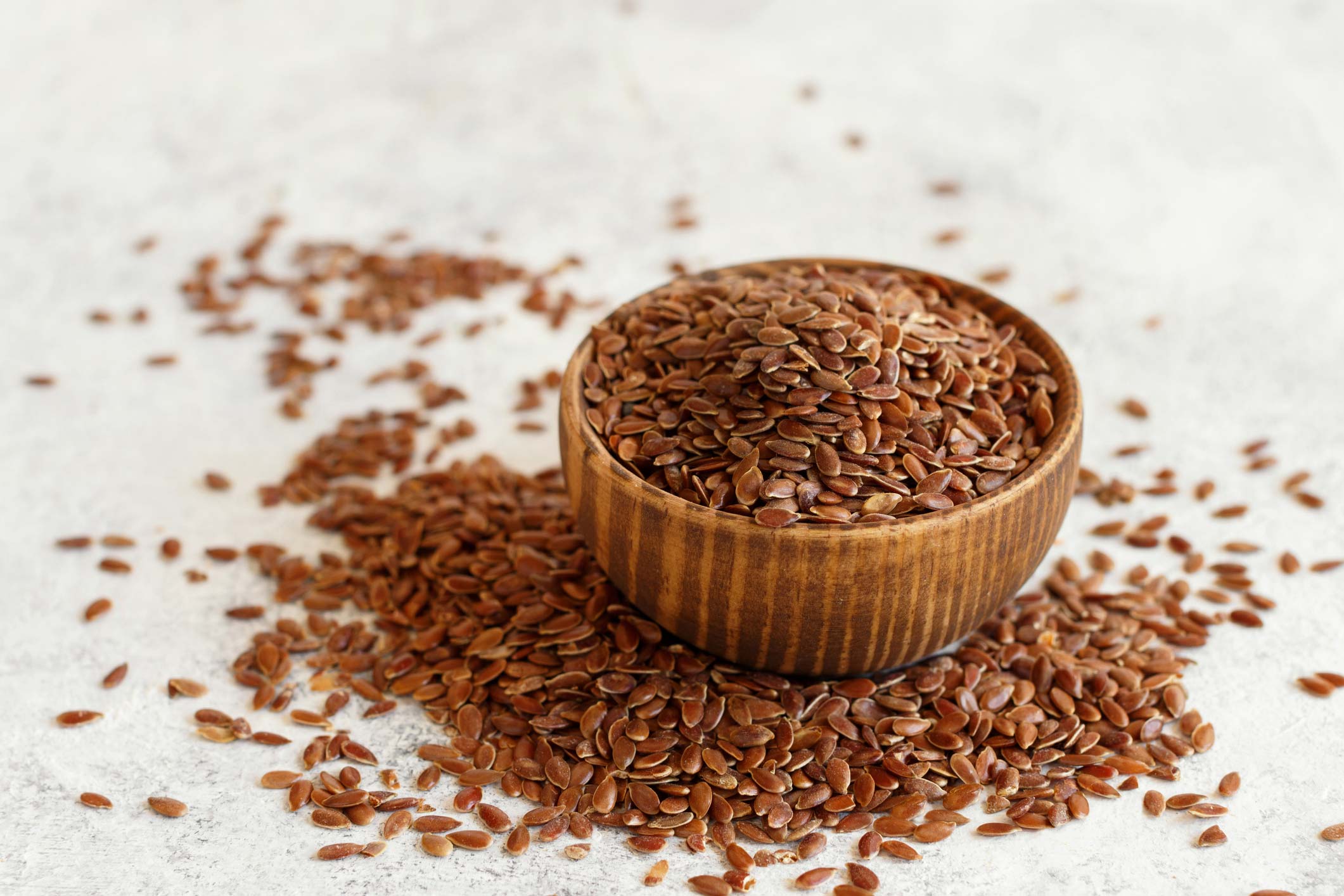You might think that flaxseeds would be happy with their newfound popularity. After years of relative obscurity, these little seeds can take their place as a functional food, rich in antioxidants, healthy fats, fiber, protein, and an impressive array of vitamins and minerals. Their purported benefits have gained lots of attention, prompting more people to learn how to incorporate them in everyday meals and snacks. And flaxseed has the numbers to back it up. In fact, the estimated global flaxseed market was valued at $423.3 million in 2018, with a projected 12.7% annual increase forecasted through 2025.
But today’s popularity pales in comparison with flax’s glory days, which began about 30,000 years ago and only began to wane with the rise of the cotton gin. Flax has been a staple crop for much of Asia, Europe, and the Americas for a long time, thanks to its uses as a food, oil, and fiber.
Its botanical name, Linum usitatissimum L, contains two clues as to how revered the plant used to be. Usitatissimum, which I can’t say five times fast, means “most useful” in Latin. And in “linum,” you’ll recognize the word linen, the fabric made from flax fibers. But if you look even deeper, you’ll discover that we also get the English word “line” (as in cable or rope) from this amazing plant. So next time you think in a linear fashion, admire the lining of a dress or blazer, or step out in Western duds for some line dancing, think of flax.
In terms of its use as an edible plant, flax is most commonly used in its whole food form. However, flax is also sometimes taken as a supplement and sold as flax oil, each of which has a variety of different health uses.
But despite all the talk about flaxseed benefits, some people also have concerns about certain compounds found in them, specifically “anti-nutrients” and potentially toxic compounds.
So, are flaxseeds good for you? Or should you avoid them? And, how can you effectively use flaxseeds to gain the most health benefits from them?
What Is Flax?
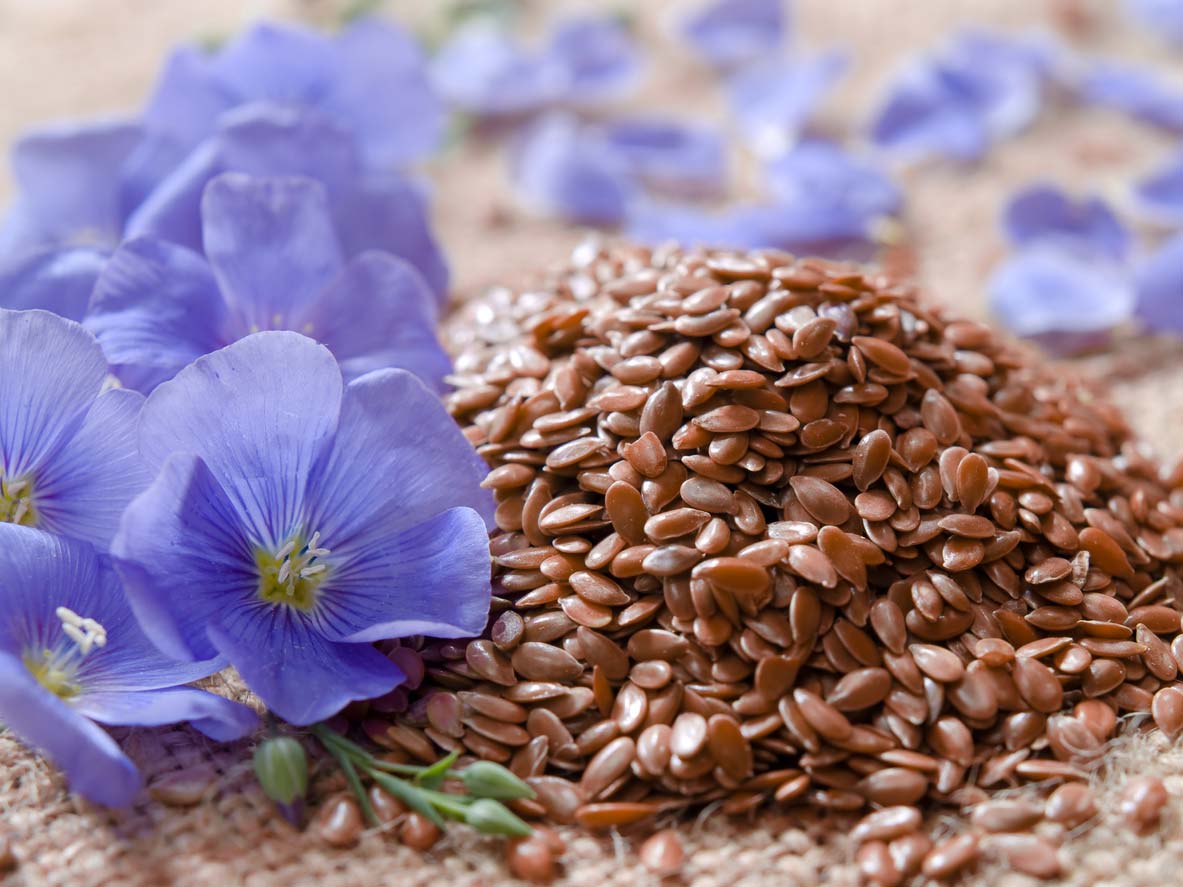
Flaxseeds are the seed of the flax plant. The plant itself produces beautiful blue flowers, which in turn become pea-sized capsules, each of which contains around six seeds. Flaxseed is also known as linseed, and these terms are sometimes used interchangeably. However, flaxseed refers to flax when it’s eaten by humans, whereas linseed denotes the plant’s industrial purposes.
Flax is one of the oldest grown crops, and it continues to be cultivated for both animals and humans around the world. Most flax (linseed) is grown in Russia, India, and Europe, and turned into linen fabric.
During the 19th century, flax was also grown in nearly every US state east of the Mississippi River. Although today, it’s almost exclusively grown in Minnesota and North Dakota for oil and seeds.
You’ll find two main types of flaxseeds in stores: golden and brown. While the most obvious difference between them is their color, the main nutritional difference is in the makeup of their overall oil content: alpha-linolenic acid or ALA (one of the omega-3 fatty acids associated with human health, along with EPA and DHA) comprises 59% of the total fat content in brown flaxseed and 51% of the total fat in golden flaxseed.
Flaxseed Nutrition
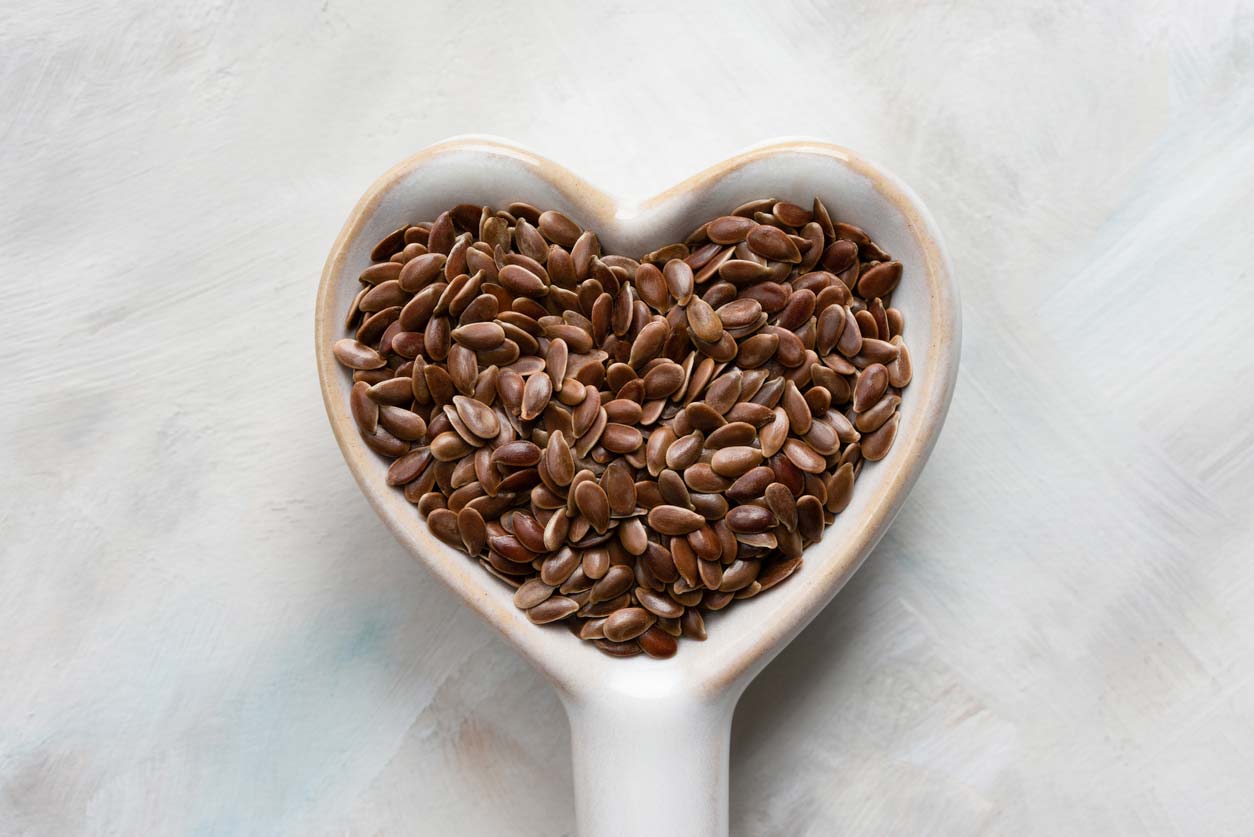
While flaxseeds are tiny, don’t let their size fool you. Even a small serving of flaxseeds contains a massive amount of nutrition. Just one tablespoon of whole flaxseed is a serving, in which you’ll find one gram of protein, three grams of fiber, a variety of B vitamins, around 10% of your daily needs for magnesium, manganese, and phosphorus, and a remarkable amount of omega-3 fatty acids.
Flaxseeds are also the richest source of precursors to lignans, a type of polyphenolic compound in plants that has potent antioxidant activity. Lignans may have anticancer and glucose control benefits and potentially play a role in reducing high LDL cholesterol, atherosclerosis, and high blood pressure.
When you eat flaxseeds, your gut bacteria convert these lignan precursors into the lignans enterolignan, enterodiol, and enterolactone (don’t they sound like secretive, morally neutral characters from the Lord of the Rings saga?). But individual differences in metabolism and individual gut health will determine their rate of conversion. Overall, taking this variable conversion into consideration, flaxseeds generate somewhere between 75–800 times more lignans than any other human food source.
As a rich source of omega-3 fatty acids, flaxseeds contain around 2.3 grams of ALA per tablespoon. They serve as the best food source of these healthy fats for people who don’t consume fish or seafood.
However, flaxseeds are not a great source of the other omega-3 fats, EPA and DHA. While your body can convert some ALA to EPA and DHA, this conversion rate is generally low and varies between individuals. Some research suggests that women may be better at this conversion than men because of their naturally higher estrogen levels. But only 1–10% of ALA is converted into EPA, and 0.5-5% into DHA.
For more on omega-3 fatty acids, click here.
5 Major Health Benefits of Flaxseed
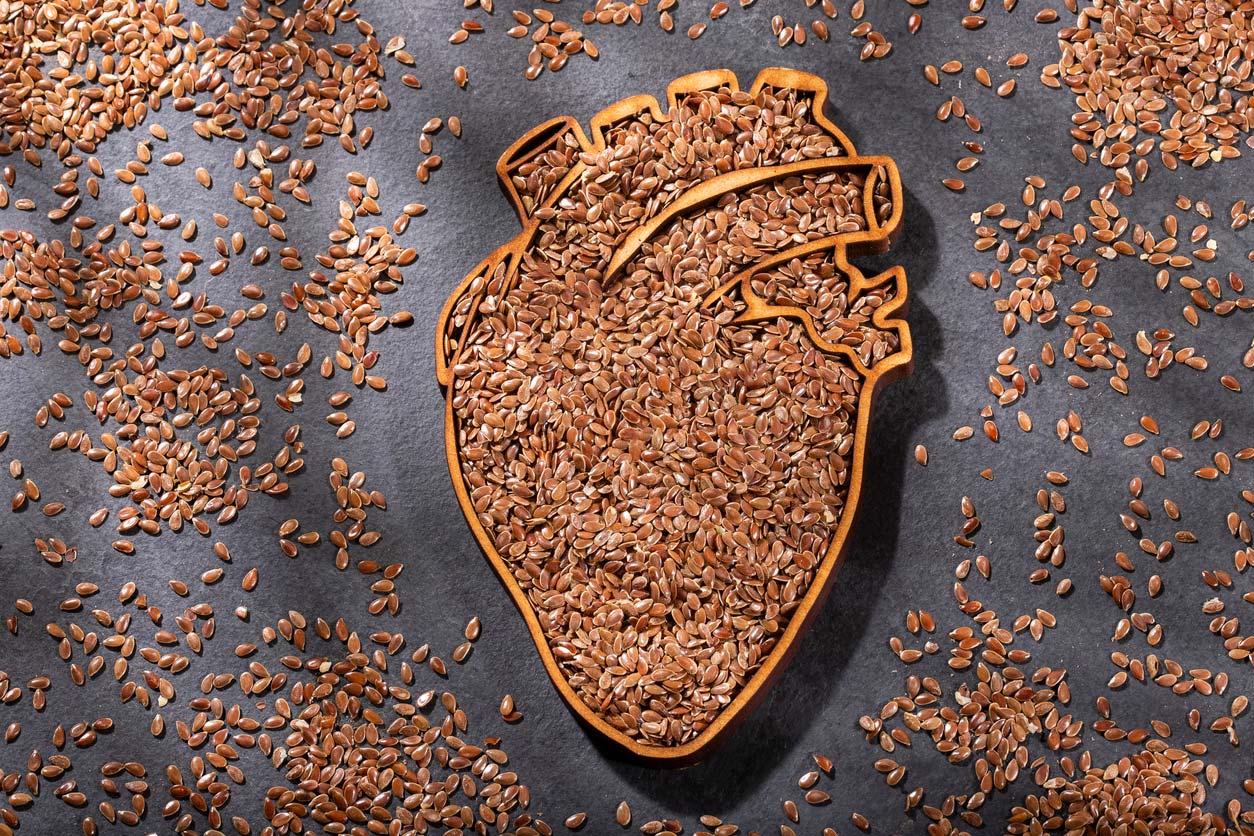
Adding even a small amount of flaxseeds to your lifestyle can really make a difference in the health department. Below are some of the main benefits that flaxseeds have to offer.
1. May have anticancer properties.
Flaxseeds are a rich source of compounds that offer potential anticancer properties, particularly their omega-3 fatty acids and the lignan precursors we discussed above.
Lignans have antiestrogen activity and are structurally similar to estrogen, with the ability to bind to cell receptors and reduce cell growth. Research shows that the combination of omega-3 fats and lignans may be especially beneficial in relation to diseases like breast cancer. And some animal studies have found that ALA may reduce the size, growth, and spread of breast cancer cells, as well as promote cancer cell death.
A 2018 lab study also found that the lignans in flaxseed helped improve the ability of chemotherapy agents to kill breast cancer cells, compared to the medication on its own.
Similarly, a 2019 study examined the effects of flaxseed oil on cancer cells in vitro, finding that its inclusion in a mixture of fatty acids reduced cancer cell growth and induced death in some of the cancerous cells.
2. May benefit heart health.
Some of the most common risk factors for heart disease include high cholesterol and high blood pressure, as well as atherosclerosis, or the buildup of plaque in the arteries that can lead to events like heart attacks and strokes. The omega-3 fatty acids, fiber, and lignans in flaxseeds may offer a protective effect against these risk factors when consumed on a regular basis.
A 2015 randomized controlled trial found that the combination of ingesting 30 grams per day of flaxseed with cholesterol-lowering medications — primarily statins — for 12 months, was associated with a significant reduction in total and LDL “bad” cholesterol levels, compared to medication alone.
And in a 2019 randomized, double-blind placebo-controlled clinical trial carried out among 80 hyperlipidemic and hypertensive adults, researchers found that eight weeks of supplementing 36 grams of flaxseed per day was effective for reducing waist circumference, waist-to-hip ratio, triglycerides, total cholesterol, and LDL “bad” cholesterol compared to placebo.
Furthermore, consuming flaxseed could help lower high blood pressure for some people. A 2015 meta-analysis of 11 studies found that eating flaxseed appears to be most effective in lowering blood pressure when consumed daily as a whole food and for a period of at least three months. To make consuming the amount of flaxseed suggested for blood pressure benefits more achievable — which in some cases is 30 grams of milled flax meal per day, or around four tablespoons — some researchers suggest using them in baked goods like muffins.
As for atherosclerosis, a 2016 review concluded that regular inclusion of flaxseeds could slow the progression of — and even help to reverse — atherosclerosis among some people. In fact, the authors suggest that flaxseed could serve as an important prevention method for atherosclerosis and related cardiovascular diseases.
3. May help balance mood.
Omega-3 fatty acids are very active in the brain and have been widely studied for their role in mental health, including improving symptoms of depression. One 2020 study among 60 depressed adult women, published in the International Journal of Food Properties, looked at the effectiveness of flaxseed oil in helping manage depression. They split the women into two groups, one that consumed a 1,000 mg flaxseed oil capsule twice a day for 10 weeks, and a placebo group. The researchers found that the intervention group experienced a reduction in depression symptoms as well as a significant increase in brain-derived neurotrophic factor (BDNF) concentration. Higher levels of BDNF in the brain are associated with a reduced risk for depression and with increased capacity for learning, memory, and peak brain performance.
4. May offer anti-inflammatory benefits.
The omega-3s and lignans in flaxseeds also may help alleviate inflammation for some people, helping with conditions like rheumatoid arthritis, lupus, and Raynaud’s phenomenon.
A 2016 review published in Nutrients looked at the effects of flaxseed consumption on the inflammatory biomarker C-reactive protein (CRP). The meta-analysis found that while flaxseed consumption didn’t affect CRP levels in the general population, it did appear to be an effective intervention in obese individuals.
5. May improve symptoms associated with type 2 diabetes.
Flaxseeds have antioxidant, hypolipidemic, and hypoglycemic effects, thanks again to their lignan and omega-3 fatty acid content. Research has demonstrated that flaxseed consumption can help improve blood sugar control, potentially even delaying or helping to reverse the progression of type 2 diabetes in humans.
In a 2018 study published in Nutrition & Metabolism, researchers gave 53 obese patients with type 2 diabetes and constipation either 10 grams of flaxseed pre-mixed into cookies twice per day or placebo cookies for a period of 12 weeks (that must be a weird business: making placebo cookies for nutritional studies). Those who received the flaxseed cookies as a daily snack experienced a significant reduction in reported constipation symptoms and weight, as well as blood sugar and lipid levels.
Flaxseed Criticisms and Concerns
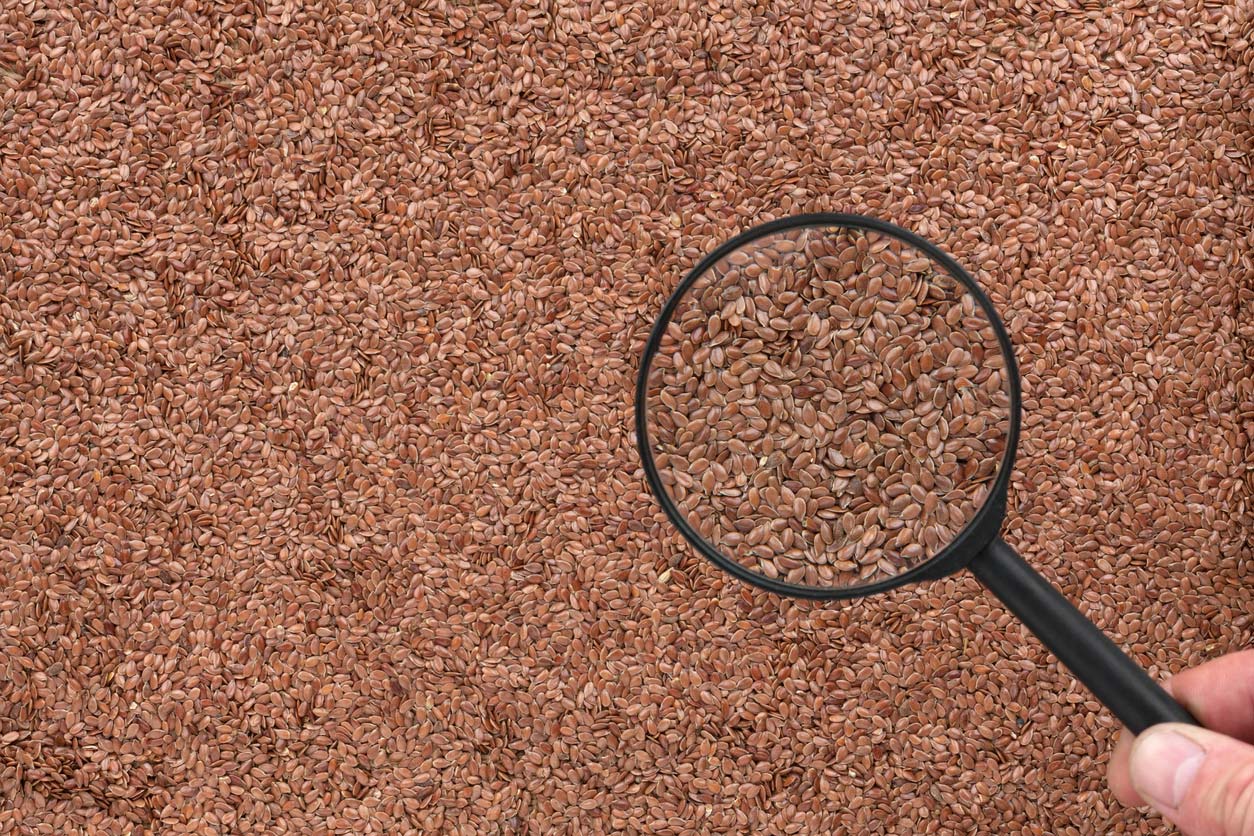
Despite all of the reasons to consider adding flaxseeds to your diet, they also come with some potential considerations.
Cyanogenic Glycosides
Flaxseeds (along with many other plant foods) contain cyanogenic glycosides, which are a group of natural substances that release small amounts of the toxic compound cyanide. These compounds break down in the presence of heat, such as during cooking. Those most likely to experience health problems from consuming cyanogenic glycosides generally have a poor-quality diet in general, lacking in iodine and high-quality protein sources, as well as overall calories. But for most of us, eating a moderate amount of flaxseeds — like one or two tablespoons per day — is not likely to pose any health problems.
On the other side of the coin, cyanogenic glycosides may not be totally bad, as some research suggests that they could actually have anti-tumor effects.
Phytates
Phytates, plant compounds that are sometimes described as “anti-nutrients,” are also found in flaxseeds. Some people worry that phytates inhibit absorption of other nutrients, particularly minerals like zinc, iron, and calcium, when consumed at the same time. But phytates may also offer some benefits to human health, such as anticancer and antioxidant activity.
Overall, phytates in flaxseeds are unlikely to have a negative effect on your nutritional status as long as you eat a well-balanced diet. And when you soak, cook, or ferment phytate-containing foods, much of the anti-nutrient content is eliminated anyway. For more on phytates, click here.
Cadmium
Cadmium, a heavy metal found in soil, can accumulate in flaxseeds. Some people find this concerning because cadmium is highly toxic to the human body. It sticks around in our bodies for decades because we don’t have an efficient way to get rid of it, and it may contribute to a variety of illnesses, including heart disease, cancer, and type 2 diabetes.
While vegans and vegetarians may have more overall cadmium intake from their diet, they appear to absorb less of it compared to meat-eaters. Why? While more research is needed, it appears that there’s something in plants that can inhibit cadmium absorption in the body. Plus, fiber and phytates in flax can actually help bind to and flush out excess cadmium (another benefit of phytates!).
Phytoestrogens
Some people are also fearful that eating flaxseeds might increase estrogen levels due to their high phytoestrogen content. However, research shows that the phytoestrogens and lignans in flax may actually team up to help balance estrogen levels, increasing or decreasing estrogen levels as needed. Plus, the phytoestrogens in flaxseed might actually block or antagonize the effects of estrogen in some tissues since they compete with the hormone for the same receptors.
Digestive Issues
Lastly, some people may experience digestive symptoms after consuming flaxseeds — including bloating, cramping, increased gas, diarrhea, or constipation. These digestive issues may come from the concentrated fiber and lignan content in flaxseeds. Fiber and lignans can act as a laxative, or contribute to constipation, depending on individual bowel health. If this is a problem for you, you can minimize the side effects by starting slowly, gradually increasing your intake to one or two daily tablespoons, and making sure to drink plenty of water.
Flaxseed Oil & Other Products
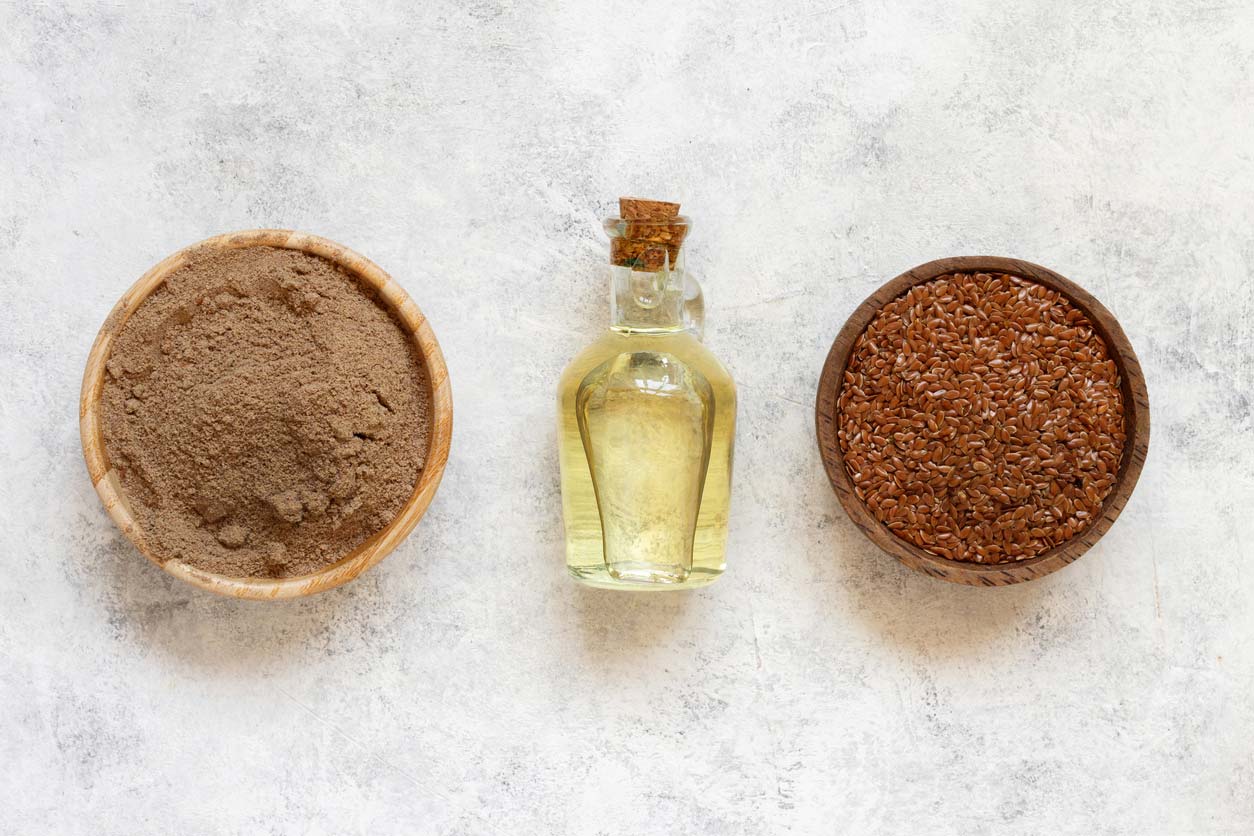
One problem with eating whole flaxseeds is that they can easily go in one end and out the other because of their sturdy hulls. But they won’t do your body any real good unless you can break them down. That’s why it’s often recommended to use ground flax or other flax products where the seeds have been crushed. Not only does this process help with digestion, but it ensures that you’ll reap all the health benefits of flaxseeds.
Besides whole flaxseeds, other major flax products are flaxseed oil, flax meal, and flax flour. You can make your own super-fresh flax meal by grinding whole flax seeds in a dedicated coffee grinder (but more about that in a minute).
Flaxseed Oil
Flaxseed oil is used as a food or supplement to obtain ALA omega-3s. But it doesn’t have quite the same nutrient profile as whole flax. Flax oil has little or none of the fiber of whole flaxseeds, and may have less of their precious lignans. But it does have a higher ALA content.
Keep in mind that flax oil — unlike flaxseeds — is not suitable for cooking or baking. This is because it’s cold-pressed and doesn’t have a high smoke point, which means that it’s more likely to go rancid when heated, producing harmful compounds.
You can usually find flax oil in the refrigerated section of natural foods stores and sometimes in other grocery stores and online marketplaces. However you obtain it, be sure to keep your flax oil in the fridge, in the dark, and as fresh as possible. It’s best to consume it well before its expiration date. The best brands will actually tell you the “press date” on the bottle, so you can aim to use it within a few months of when the flaxseeds were actually turned into oil.
Flax Meal
Flax meal, or ground flaxseeds, make it easier for your body to digest and absorb the nutrients found in flaxseeds. You can purchase pre-ground flaxseeds, but these are more prone to oxidation, and go rancid more quickly than whole flaxseeds — much like flax oil. Instead, I like to buy whole flaxseeds and grind them myself at home each week. (You can use a dedicated coffee or spice grinder for the job.) I then store the ground flaxseeds in the fridge and eat one to two tablespoons per day. You can sprinkle them on all kinds of dishes.
Flax Flour
Flax flour is ground down finer than flax meal. It’s also more nutritious than some of the other flours. Still, this is a more processed product, and it may be better to prioritize whole flaxseeds or flax meal. You can use both flax meal and flax flour, as a substitute for eggs or fat in some baked goods as well as a replacement for some of the flour.
Other Flax Products
When shopping, you might also find flax milk (which is usually just water, flax oil, and some things added to the mix to make it white, thicker, and flavored), flax cereal or granola, flax crackers, and flax-sourced protein powders (although these miss out on the goodness of flax oil, lignans, and fiber). Generally speaking, I say skip those or stick with homemade varieties, like our flax cracker recipe, below.
How to Store Flaxseeds
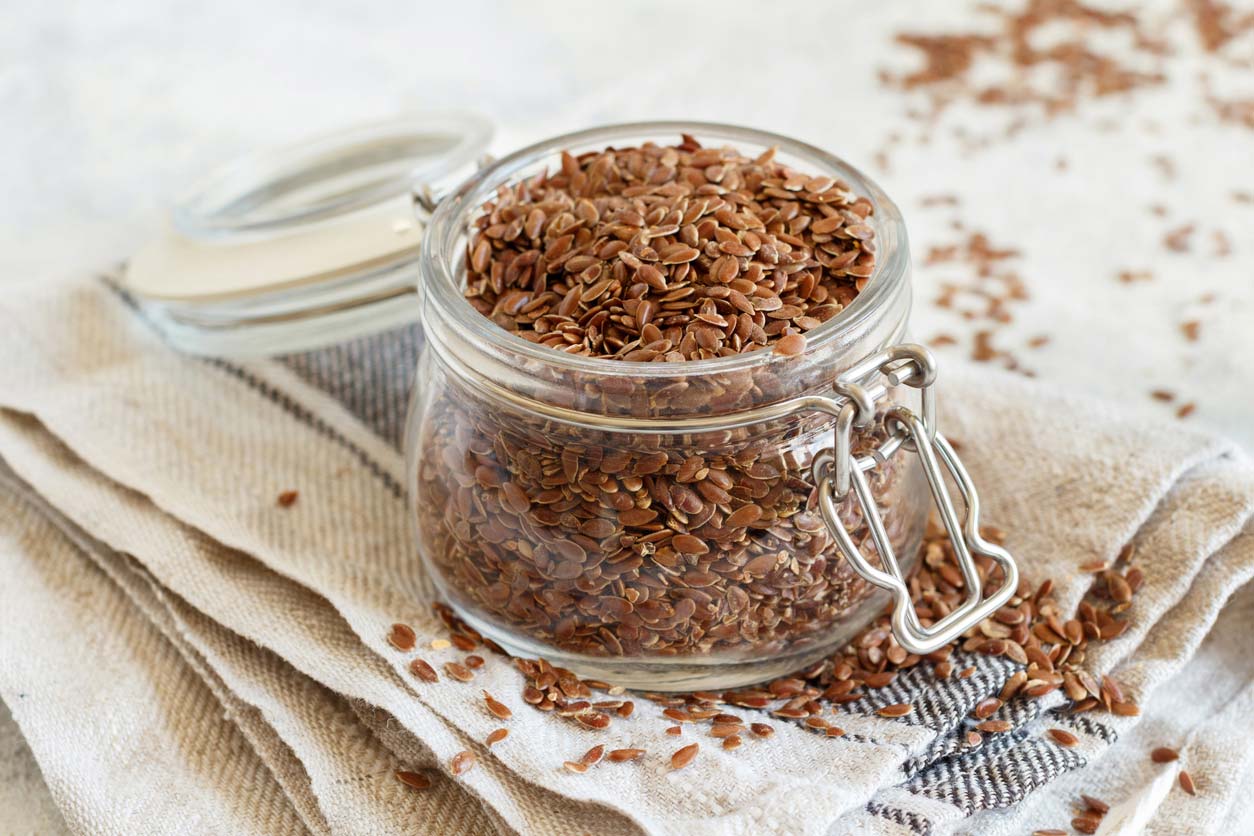
The high oil content of flaxseeds makes storage in the refrigerator or freezer essential to prevent rancidity and extend shelf life as long as possible. If your flaxseeds have gone bad, you’ll notice that they may smell sour or taste bitter.
If unopened, you can also store whole flaxseeds in your pantry, where they should last between six to twelve months. In a refrigerator or freezer, whole flaxseeds can last for up to a year in an airtight container.
It’s also best to store flax oil and flax meal in the fridge, and make sure to use them pretty quickly, so they don’t deteriorate.
How to Use Flaxseeds
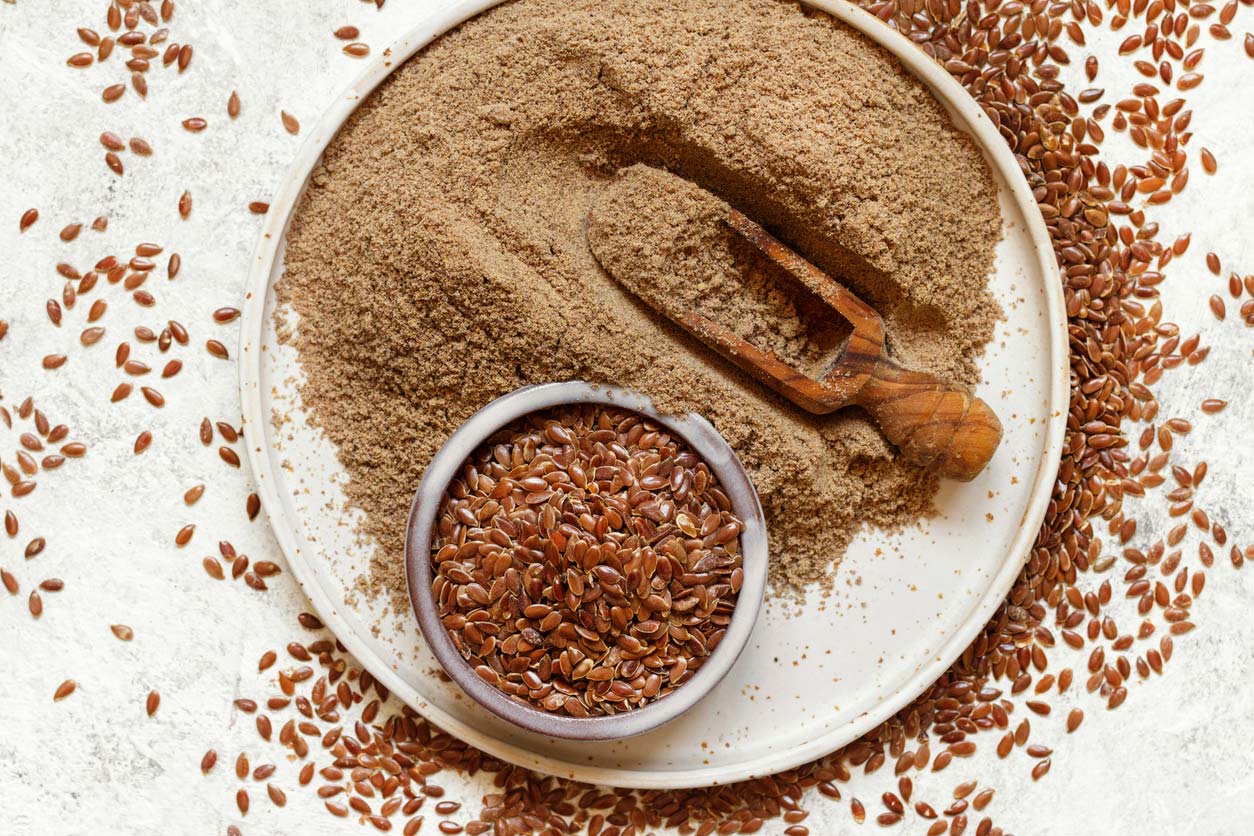
It’s best to blend or grind whole flaxseeds, unless you’re sprouting or baking them, so you can digest them and reap their benefits. Ground flaxseeds go well in baked goods, homemade crackers, or granola, as well as sprinkled on salads, casseroles, yogurt, or oatmeal.
They’re also great in smoothies, mixed into salad dressings and veggie burger patties, and used as vegan eggs in pancakes and baked goods. For the equivalent of one egg, gently mix together one tablespoon of ground flax with 2.5 tablespoons of water and let your mixture sit for five minutes to gel. Then, use it in your recipe just as you would a non-vegan egg. This works well in many baked goods, though I can’t recommend it as a replacement for scrambled eggs!
Flax oil works well as a drizzle on salads, cooked leafy greens, baked potatoes, and cooked sweet potatoes. You can also use flax oil in homemade salad dressings or other sauces. And some people take flaxseed oil pills as a supplement or constipation aid.
Flax-Filled Recipes
Flax is not only nutritious, but it’s also versatile! From adding texture and flavor to smoothie bowls to creating crunchy and fun crackers to acting as the “egg” in plant-based burgers… Gee, is there anything flax can’t do? Enjoy these flavorful flaxseed recipes, and let us know what you think!
1. Berry Delicious Omega Smoothie Bowl
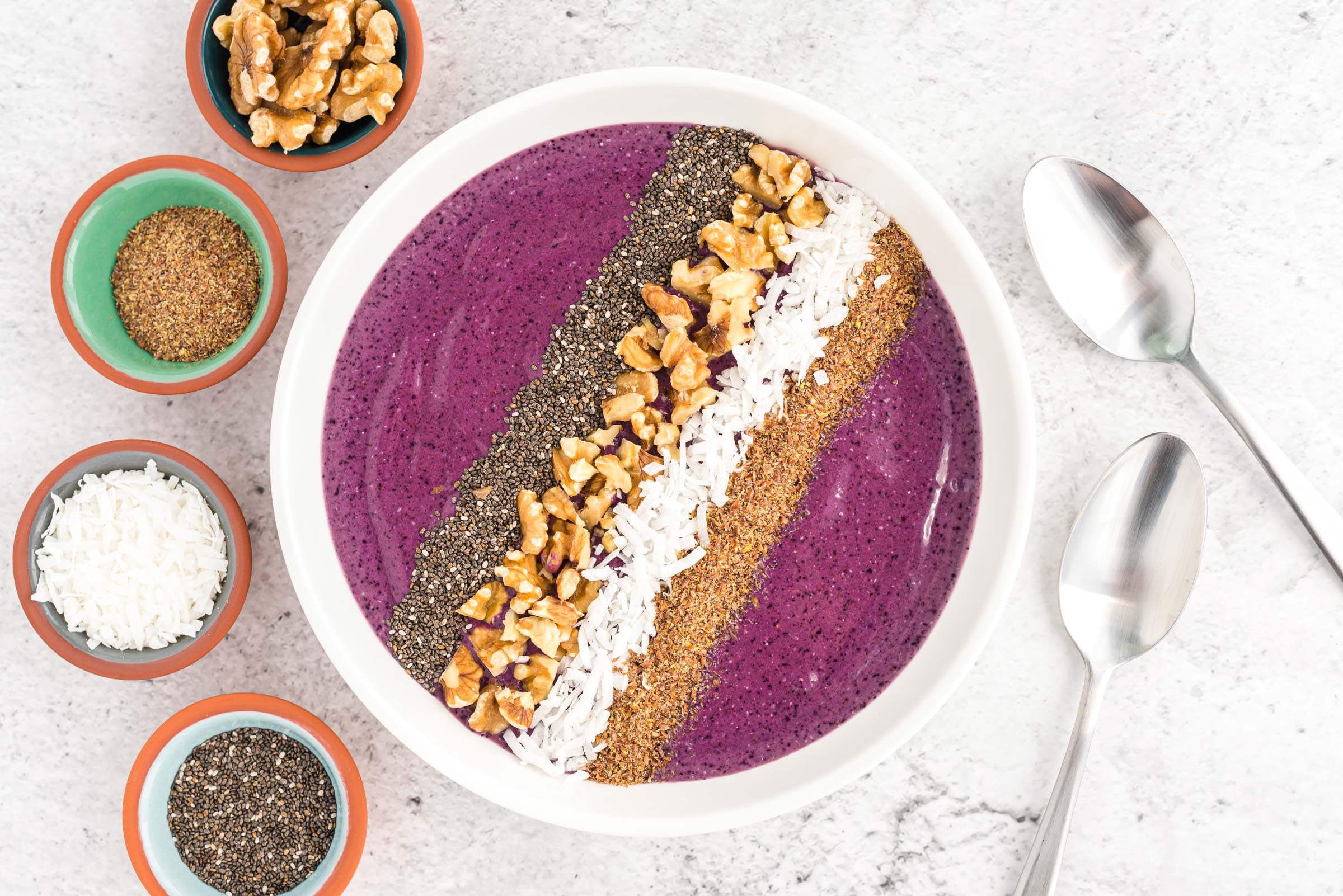
Smoothie bowls make incorporating a tablespoon (or two!) of flax meal into your diet easy and fun! Sprinkle flaxseeds on top of a smoothie bowl or add to the base if you’d like to create a thicker consistency (since flax meal absorbs liquid). Enjoy maximizing your phytonutrients and omega-3 fatty acids in one creamy and satisfying meal!
2. 2-Ingredient Flax Crackers
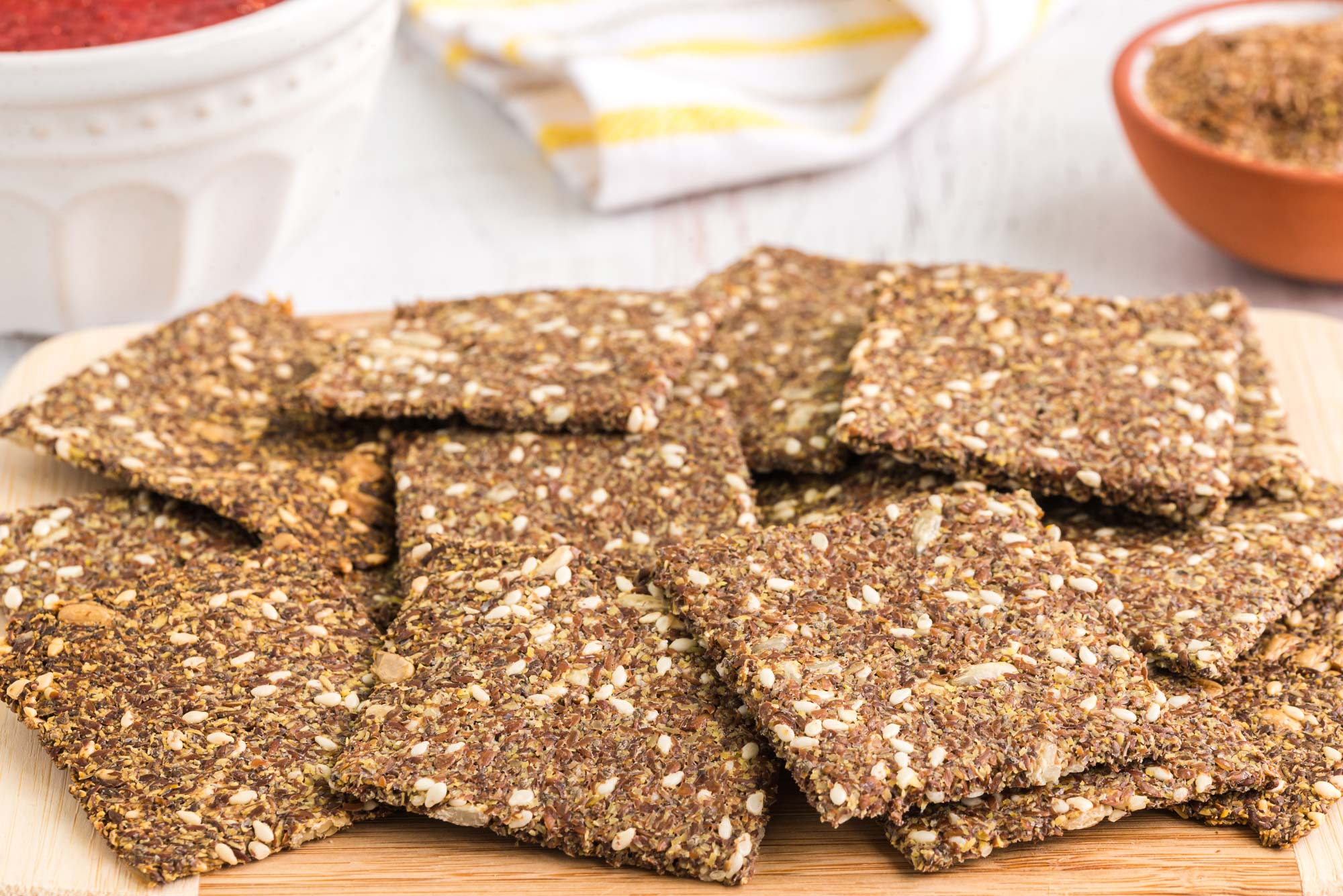
If you haven’t tried making your own crackers yet, now is the time to see for yourself how the humble flaxseed can create a crunchy, savory snack. All you need is an oven for baking, a bowl for mixing, and a little muscle for rolling. Then bake, and voila! Crispy, nutritious crackers await you. Spread your favorite plant-based cheese or hummus on top, or make a “cracker sandwich” with veggies and bean spread. Yum!
3. Southwest Veggie Burgers
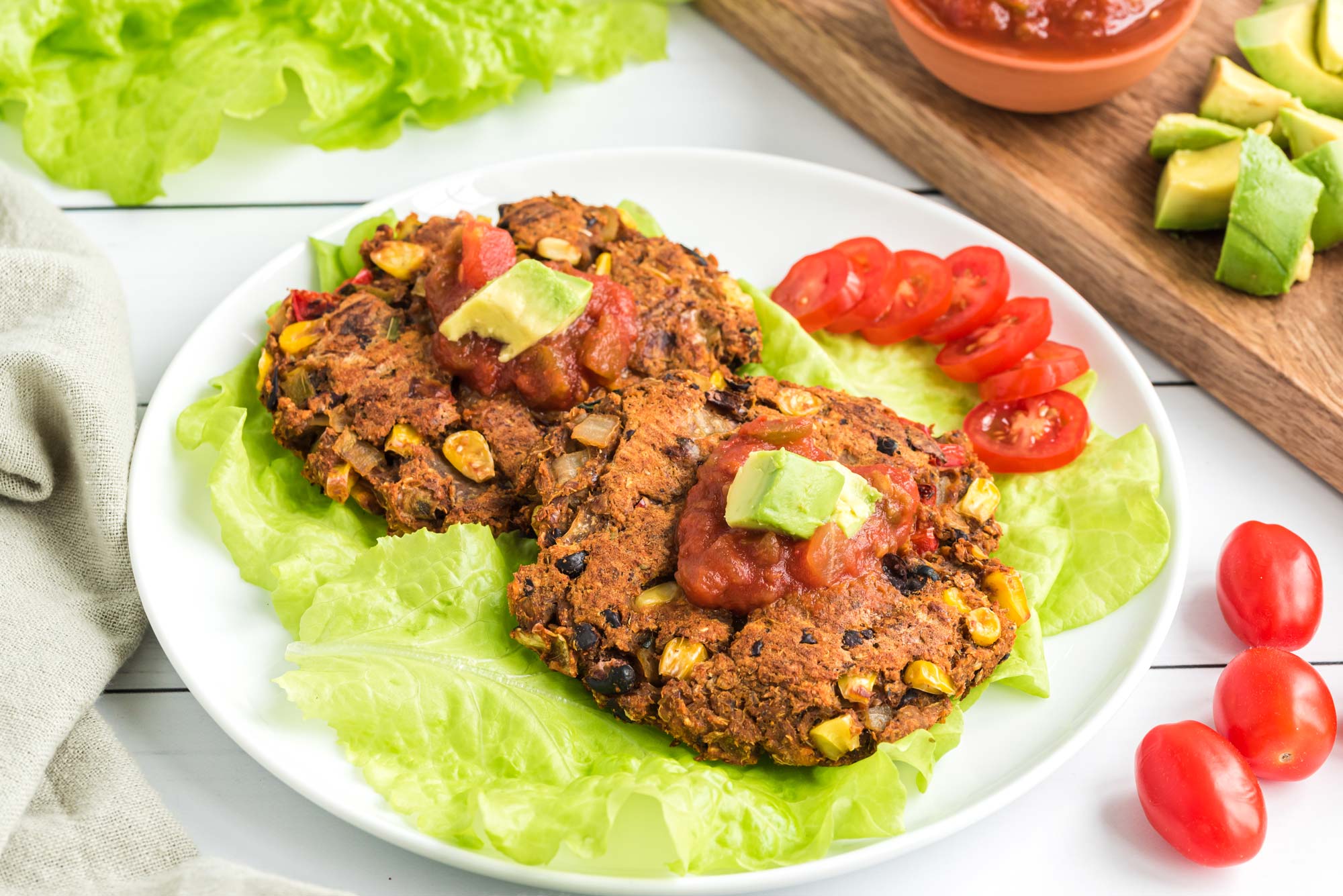
These burgers achieve “grillable” status thanks to the flax meal that helps to bind and hold them together. With one ingredient, you’re removing the saturated fat and animal protein found in eggs (along with the associated lifestyle diseases) and adding plenty of fiber, plant protein, and phytonutrients (that are health-promoting). Plus, these burgers are super tasty. It’s a win-win-win!
Flaxseeds Are Good for You
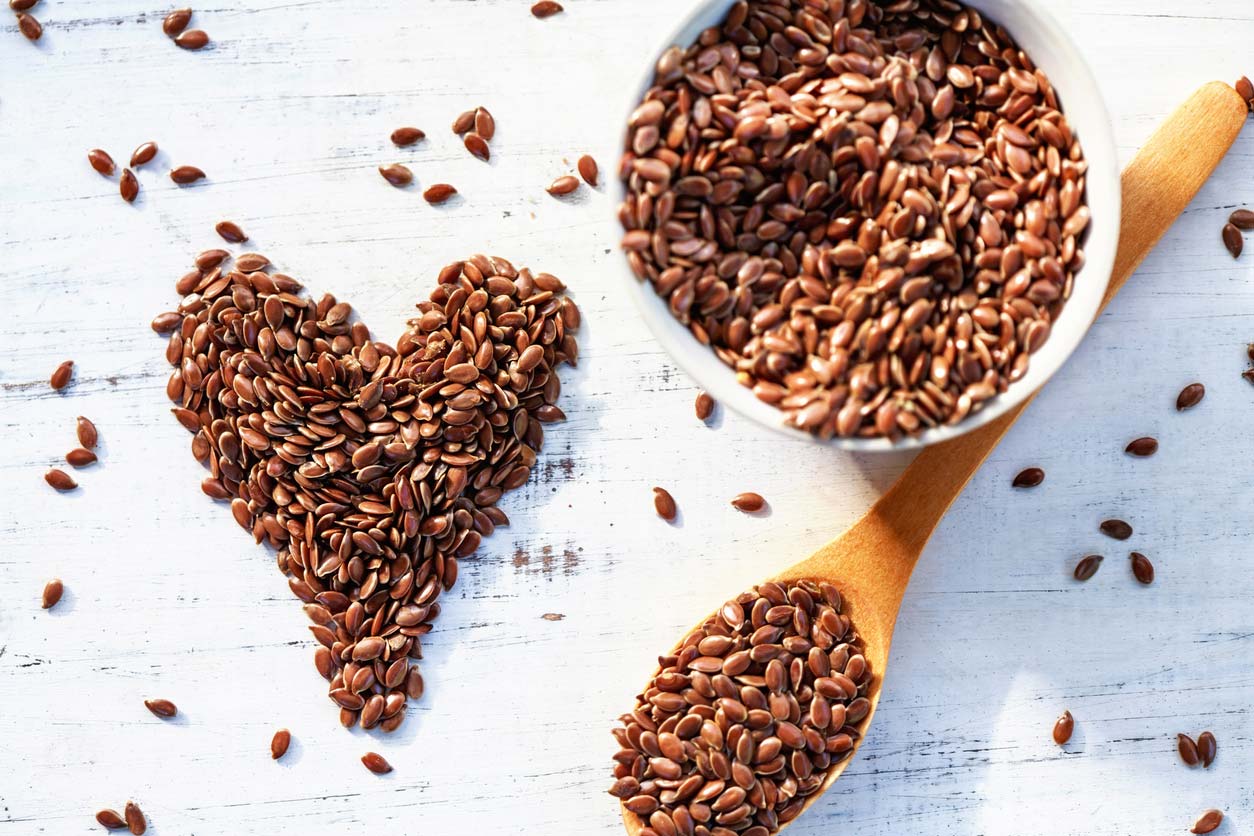
Flaxseeds are highly nutritious and have numerous health benefits and uses. The various forms — oil, meal, and flour — can all make a contribution to a healthy, balanced diet. Although some considerations surrounding compounds found in flaxseeds exist, the data shows that in most cases, there’s no need for concern.
The biggest problem is that whole seeds are hard to chew and are poorly digested. And flax oil and flaxseed meal deteriorate rapidly. But there’s an easy remedy for that! Grinding your own homemade flax meal with a dedicated spice or coffee grinder every week can give you a steady supply of fresh flax meal. And what an affordable and delicious way to add a stunning amount of nutritional goodness to your diet.
Tell us in the comments:
- How do you currently enjoy flaxseeds in your diet?
- Have you ever used flax oil?
- Do you have a dedicated flaxseed grinder at home?
Feature image: iStock.com/Karisssa
